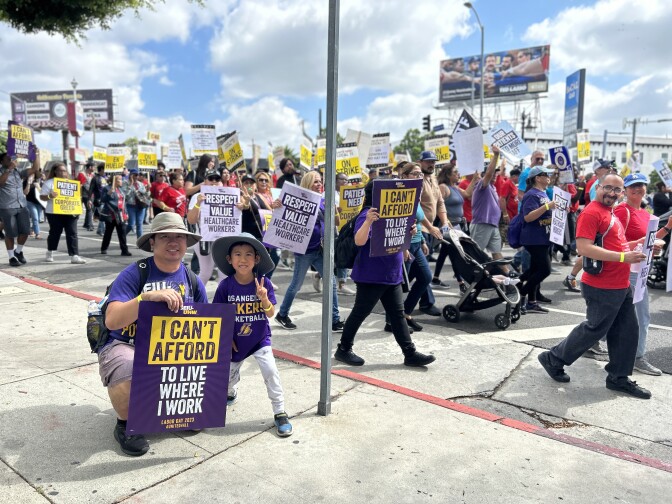Tracy McDaniel has worked at Kaiser’s West Los Angeles Medical Center for 26 years. She used to live a few blocks from the hospital on the west side, a quick 15-minute drive to her job as a financial counselor for low-income patients. But five years ago, that changed.
“My rent was going up every year, and it got to the point where I could not afford where I was living,” McDaniel said.
When the rent for the one-bedroom apartment she shared with her husband climbed to $2,000 a month, they couldn’t balance the books, especially after her husband had a car accident, lost his income and disability payments stalled.
“We were just losing everything,” McDaniel said. “I had to move to the Valley to find cheaper rent.”
Now she drives more than 30 miles to work, sitting in traffic for an hour and a half or more. Though her expenses have evened out a bit, she said she still has to work double shifts to make ends meet. McDaniel, who grew up in Crenshaw, said the experience has been traumatizing.
“I’ve lived here all my life … It was just traumatic for me to have to go as far as I went, it broke my heart,” McDaniel said. “But my hand was forced.”
It’s one reason why McDaniel took part in labor protests on Monday, sitting in a circle of fellow health care workers as part of a planned act of civil disobedience outside Kaiser’s L.A. Medical Center in Hollywood.

Long commutes: Bad for workers, bad for climate
The fact that people can’t afford to live where they work has been a throughline in labor actions this summer.
Not only are workers being displaced due to high costs, but forcing workers farther from job centers and reliable transit also exacerbates the climate crisis and local air pollution. Long commutes and a car-centric culture are main reasons why pollution from the tailpipes of cars and trucks is California’s largest source of greenhouse gas emissions.
“Around 13% of people that commute into the west side drive over 50 miles to work there,” said Chase Engelhardt, a policy expert with nonprofit Climate Resolve. “How many people commute in because our housing policies do not allow them to afford to live here?”

Research has shown that unaffordable housing is the leading cause of homelessness in L.A. County. That’s why Engelhart said affordable housing near transit or job centers is essential to both supporting workers and cutting climate pollution.
“Transportation is one space, housing is another, and both of those really tie into homelessness,” Engelhardt said. “Shortening those commutes, bringing resources closer to communities, bringing communities closer to resources and housing people is the prevention strategy of homelessness.”
Whole families uprooted and displaced
McDaniel isn’t the only one in her family who’s been displaced from home due to unaffordable rent and high living costs. She said her daughter, who was also a health care worker here in L.A., ended up moving to Atlanta because L.A. rent was just too high and she couldn’t support herself and her young children.
Now, McDaniel doesn’t get to see her daughter and grandchildren nearly as often.
“I’m missing my grandchildren,” McDaniel said. “I have to save every dime I can to try to go to Atlanta during the holidays so I get to see my kids.”
She said because they’re so short-staffed at work — a major issue McDaniel and other protesters are fighting Kaiser on — she often just can’t get the time off to visit.
“It’s just one thing after another,” McDaniel said. “It’s frustrating, every day.”









